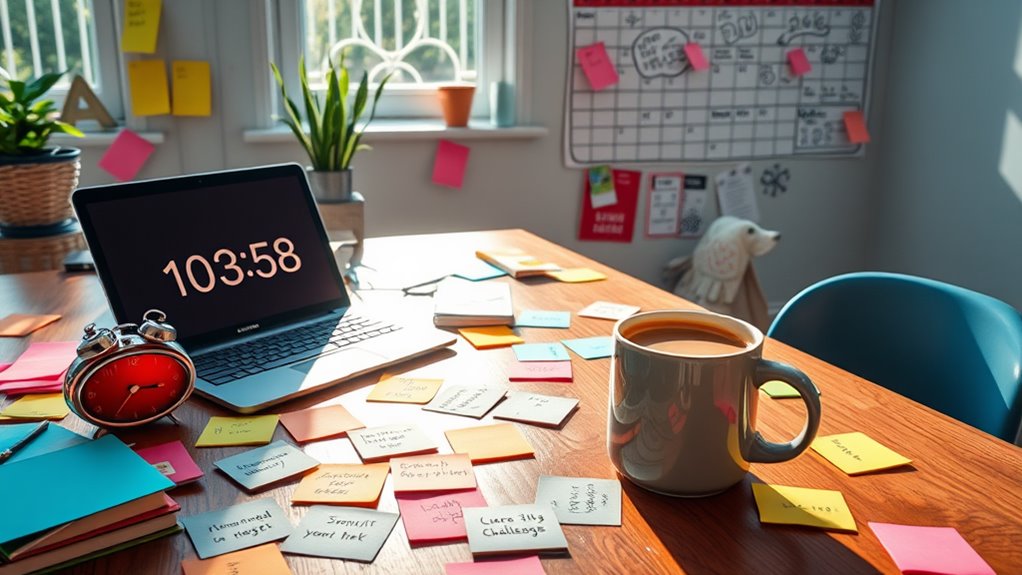How to Conquer Procrastination With a Fun Challenge
You can conquer procrastination by transforming your tasks into fun challenges. Start by identifying tasks you often avoid and create engaging themes around them, like a treasure hunt or a race. Set specific time blocks for each task and invite others to join for added motivation. Use a reward system to celebrate your progress, whether it’s small treats for completing weekly goals or bigger celebrations for finishing the challenge. Tracking your achievements boosts accountability and keeps you on track. There’s plenty more to explore, so stick around for deeper insights on making these challenges more effective!
Key Takeaways
- Identify tasks you frequently procrastinate on and create a themed challenge around them for added excitement.
- Break tasks into manageable chunks and set a timer to maintain focus and create a sense of urgency.
- Invite friends or colleagues to join your challenge, fostering friendly competition and shared motivation.
- Establish a reward system that aligns with your interests to celebrate small wins and maintain engagement.
- Track your progress regularly to enhance accountability and adjust goals as needed to keep moving forward.
Understanding Procrastination
While you might think procrastination is simply a matter of poor time management, it’s often rooted in deeper emotional and psychological factors.
You may find that fear of failure or perfectionism plays a significant role in your tendency to put things off. When a task feels overwhelming, it’s easy to avoid it entirely.
Additionally, your motivation can wane if you don’t see immediate rewards or benefits. Understanding your triggers is essential.
Reflect on why you postpone certain tasks—are you seeking comfort or avoiding discomfort? By acknowledging these underlying issues, you can start to address them.
This awareness empowers you to confront procrastination head-on, transforming it from a habit into an opportunity for personal growth and achievement.
The Power of Gamification
Gamification can transform tedious tasks into engaging challenges, making it easier to overcome procrastination. By turning your to-do list into a game, you add excitement and motivation to your day. You can create points for each task you complete, set up levels to reach, or reward yourself with small treats when you hit milestones. This approach encourages you to focus and boosts your productivity.
Additionally, incorporating friendly competition with friends or colleagues can further enhance your motivation. You might find that the thrill of racing against others pushes you to finish tasks faster.
Embrace gamification to change your mindset; instead of viewing tasks as chores, you’ll see them as opportunities to win. Enjoy the process, and watch your procrastination fade away.
Implementing Time-Blocking Techniques
One effective strategy to combat procrastination is implementing time-blocking techniques.
Start by identifying your most important tasks and breaking them into manageable chunks. Allocate specific time slots in your calendar for each task, ensuring you’re realistic about how long each will take.
Stick to these time blocks, treating them as non-negotiable appointments. Use a timer to stay focused during each session, allowing short breaks in between to recharge.
This method not only helps you prioritize but also creates a sense of urgency, making it easier to stay on track. As you see progress, you’ll feel more motivated to tackle upcoming tasks, reducing the temptation to procrastinate and boosting your productivity overall.
Creating Your Fun Challenge
To make tackling your tasks more enjoyable, consider creating your own fun challenge. Start by identifying tasks you often procrastinate on. Then, think of a theme that excites you—like a race against time or a quest for treasure. Here’s a simple table to help you brainstorm:
| Task | Challenge Idea |
|---|---|
| Cleaning the house | Set a timer for 30 mins |
| Completing a report | Write 100 words every 10 mins |
| Exercising | Do a mini workout with friends |
Once you’ve got your ideas down, set a start date and invite friends to join. Sharing the experience makes it even more enjoyable, and you’ll be amazed at how much you accomplish!
Establishing Reward Systems
After creating your fun challenge, it’s time to enhance your motivation with a reward system. Think about what excites you and use that as a basis for your rewards.
Maybe it’s treating yourself to a favorite snack, a night out, or some screen time with your favorite show. Set clear goals for your challenge, and assign rewards that match the effort you put in.
For instance, if you complete a week of tasks, enjoy a small indulgence. If you finish the whole challenge, celebrate with something bigger.
This not only boosts your morale but also reinforces positive behavior. Remember, the key is to make the rewards meaningful and enjoyable, so you stay engaged and motivated throughout your journey.
Tracking Progress and Adjusting
Tracking your progress is essential for overcoming procrastination and staying on course. Set up a simple system to monitor your achievements, whether it’s a checklist, a journal, or an app.
Make it a habit to review your progress regularly—this helps you stay motivated and accountable. If you notice you’re falling behind, don’t hesitate to adjust your goals.
Break larger tasks into smaller, manageable steps and celebrate each small win. This not only boosts your confidence but also keeps the momentum going.
Frequently Asked Questions
What Is the Psychological Cause of Procrastination?
Procrastination often stems from fear of failure or perfectionism. You might feel overwhelmed by tasks, leading to avoidance. Understanding these triggers can help you tackle procrastination more effectively and boost your productivity in the long run.
Can Procrastination Be a Sign of Perfectionism?
Yes, procrastination can signal perfectionism. You might delay tasks, fearing they won’t meet your high standards. Recognizing this pattern helps you shift focus, allowing you to embrace progress over perfection and reduce that overwhelming pressure.
How Do I Know if My Challenge Is Effective?
You’ll know your challenge is effective if you feel motivated and engaged. Track your progress, celebrate small wins, and notice if you’re completing tasks more efficiently. Adjust the challenge as needed to maintain that excitement.
What Are Some Common Distractions to Avoid?
When tackling tasks, avoid common distractions like social media, excessive notifications, and multitasking. It’s essential to create a focused environment, so you can concentrate fully and efficiently on what you need to accomplish.
Is Procrastination Linked to Mental Health Issues?
Yes, procrastination can be linked to mental health issues like anxiety or depression. When you’re feeling overwhelmed, it’s easy to delay tasks. Recognizing this connection can help you address both procrastination and your mental well-being effectively.



